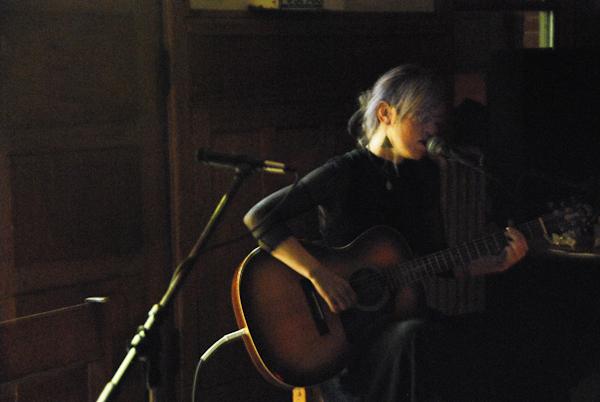Warren, Adron Collaborate Throughout Respective Sets

Portland-based singer Johanna Warren serenades Tank Co-op with her strangely enchanting guitar playing and vocals. Warrencontrasted her solemn music with quirky stage banter.
April 3, 2015
Johanna Warren and Adron distinguished themselves from the rest of the singer-songwriter crowd while remaining firmly planted in folk tradition with their show at Tank Co-op Tuesday night. The atmosphere the two musicians set embodied this contradiction. They managed to establish a relaxed yet otherworldly mood that felt both similar to other folk shows and also entirely distinctive. Tank’s homey furnishing and a small but supportive audience helped foster the intimate feeling of the show, while the musicians’ spooky storytelling and lit incense created eerier vibes. More than location, incense or ghost stories, however, it was the songwriters’ music that played the paramount role in producing this contradictory — and highly effective — atmosphere. Both Warren and Adron offered songs that could be grouped into the folk genre but simultaneously defied expectations.
Warren, who opened the show with a lengthy and gripping solo set, connected with her audience as soon as she took the stage. Setting her guitar to an open tuning — the first of a number of unorthodox tunings she utilized throughout the show — the Portland, OR, native engaged the crowd with a laugh-inducing tidbit. “Oberlin was the only college that rejected me, and it was my first choice,” she said with a chuckle. Warren exuded charisma, and showgoers participated in the fun as she continued to banter. However, she made it abundantly clear that her set wouldn’t be all laughs when she launched into her first song.
The track’s nostalgia-inducing chord progressions and haunting vocal melodies contributed to a somber tone. Most of Warren’s music stayed in moody territory, but her brooding sound never became boring or hackneyed. Complex, evocative lyrics (“My malaise was molten metal / Twisting into golden petals / Kiss me softly like a sparrow”) that often dealt with subjects uncommon to rock and folk lyricism served as a constant point of interest, as did Warren’s riffy guitar style and penchant for ending songs on unresolved chords. Whenever it seemed that she had fallen into a folky, downtempo routine, Warren made sure to keep the crowd guessing with alternate time signature rhythms, moments of startling dynamic contrast and deployment of extended guitar techniques.
Warren continued to tell amusing stories and jokes between gloomy songs without coming off as forced or unnatural. At one point, she delved into a quirky tale of her and Adron’s long-standing friendship, shedding light on the important roles the two have played in each other’s lives since their early years. When Adron joined Warren for several collaborative songs, their friendship could be heard in the music. Their voices blended together expressively; it seemed as though collaboration was second nature for the pair.
Adron’s contributions to Warren’s songs, which included everything from mournful countermelodies to bird-calls, showed that she too was a force to be reckoned with among singer-songwriters; her solo set confirmed this. Adron’s performance had a number of elements in common with Warren, but stood out nonetheless. Like her collaborator, Adron had a cozy and informal stage presence; in a move that separated her from Warren, Adron retained an informal sensibility in her lyrics, which contained colloquial phrases and the occasional swear word in place of lofty vocabulary and intricate rhyme schemes. Adron, who hails from Atlanta, GA, emphasized her guitar ability throughout her set as Warren did, but her particular playing style was hers and hers alone. Containing elements of Brazilian guitar, traditional folk fingerpicking and even pop-country influences, Adron’s technical yet eloquent playing sounded unlike Warren’s — or anyone else’s. Though it was ethereal in a manner similar to Warren’s, Adron’s singing displayed an enormous vocal range that differentiated her from Warren. In general, Adron placed herself in the same world as Warren, but nevertheless managed to leave a lasting impression.
Warren and Adron’s performances succeeded in separating the two from an arguably overcrowded genre without appearing artlessly experimental or disrespectful of folk tradition. The two musicians represented a model of what the modern singer-songwriter can be, displaying unique command over their instruments and an admirable disinterest in writing conventional songs. Unlike many of their peers, Warren and Adron appeared unafraid of moving beyond the boundaries of traditional folk music.




















